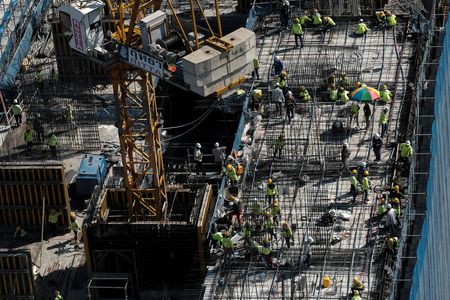By Orathai Sriring and Kitiphong Thaichareon
BANGKOK (Reuters) – Thailand’s economy grew less than expected into the end of 2024, data showed on Monday, and analysts said hopes of an improving outlook for this year are clouded by concerns that the country’s export engine could be hit with U.S. tariffs.
Southeast Asia’s second-largest economy grew 3.2% in the October-December quarter from a year earlier, up from a 3.0% pace in the previous quarter, the National Economic and Social Development Council (NESDC) said.
That missed the median forecast of 3.9% growth in a Reuters poll but was still the strongest annual rate in nine quarters.
On a quarterly basis, the economy grew a seasonally adjusted 0.4% in the October-December quarter, below the poll forecast of 0.7% growth and the 1.2% expansion in the prior quarter.
“The momentum of the economy is likely to slow down,” said Krungthai Bank economist Chamadanai Marknual.
“The government needs to quickly introduce measures to support industries, such as the automotive and real estate sectors, to stimulate the economy.”
The main stock index dropped as much as 2.8% to its lowest level in more than 4 years after the data, while the baht fell 0.3% against the U.S. dollar.
The economy has lagged regional peers as it struggles under high household debt and borrowing costs, and sluggish demand from China, which is also a key tourism market.
Full-year growth came in at 2.5%, the NESDC said, faster than 2.0% growth in 2023, while the growth forecast for this year was unchanged at a range of 2.3% to 3.3%.
NESDC head Danucha Pichayanan told a press conference that while government spending, private consumption and investment, tourism, and exports would support growth this year, Thailand’s trade surplus with the United States was a risk as President Donald Trump imposes tariffs on trading partners.
“It is undeniable that Thailand is also in the spotlight on this matter… and that requires urgent attention to address and find ways to negotiate to reduce the impact on Thai exports,” he said, as the agency upgraded its forecast for export growth this year to 3.5% from 2.6%.
Capital Economics said while economic growth has slowed, “we are expecting a better year ahead, with loose fiscal policy and further recovery in tourism spending set to be the key drivers”.
The government is optimistic its signature “digital wallet” stimulus scheme and other measures will stimulate the economy as it aims for 3.5% growth this year.
The NESDC maintained its forecast for 38 million foreign tourists to visit this year, below the record of nearly 40 million in 2019, the year before the COVID-19 pandemic.
Despite the lower-than-expected fourth quarter growth numbers, Danucha said the economy was expanding and there was no need to cut interest rates at the moment.
“We should be calm and wait and see,” he added.
In December, the Bank of Thailand left its main interest rate at 2.25% following a surprise quarter-point cut in October.
Last month, the central bank governor told Reuters the current policy rate remained suitable, given high household debt, even though growth could be below 2.9% this year.
The next policy review is scheduled for February 26.
($1 = 33.61 baht)
(Reporting by Orathai Sriring, Kitiphong Thaichareon and Thanadech Staporncharnchai; Editing by John Mair)











